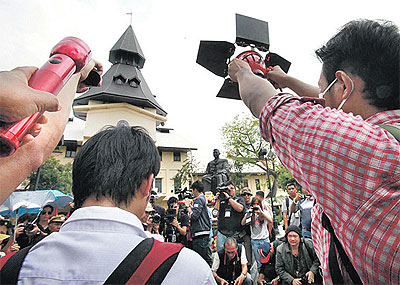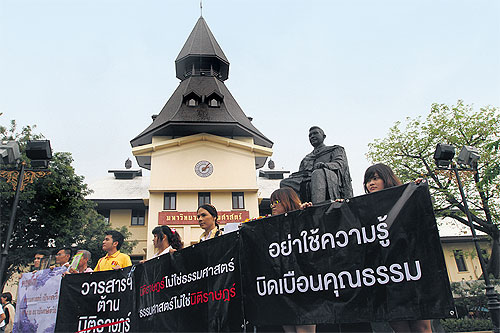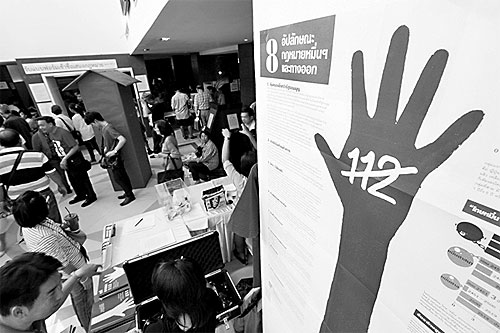
Yet more on Thammasat, lèse-majesté, and the Nitirat Group:
Today’s Bangkok Post reports:
Thammasat University’s executive committee will reconsider its decision to prohibit the use of the campus for activities related to the lese majeste law.
Thammasat rector Somkit Lertpaithoon said he will ask executives to reconsider the decision to prohibit such activities on the grounds as the issue has widened divisions at the university.
Mr Somkit said he will propose a rethink on the ban at a meeting of the university executives on Feb 13.
The ban resulted from a campaign by the Nitirat group, a gathering of academics seeking an amendment to Article 112 of the Criminal Code, better known as the lese majeste law.
This movement has drawn significant opposition, leading the university to ban all campaigning relating to Article 112, by Nitirat or others, on its grounds, for fear violence could erupt between those opposed to the law and those seeking to keep it.
But critics of the ban say it is violating freedom of expression.
Nearly 200 protesters, including students, turned up at Thammasat University yesterday in opposition to the ban.
Meanwhile, the Post says Army chief Prayuth Chan-ocha weighed in on the Nitirat group today:
The group of seven Thammasat law professors, known as the Nitirat (enlightened jurists), should stop calling for a change in the lese majeste law, national army chief Prayuth Chan-ocha said Monday.
“I don’t understand their objective, because when a law is violated officials have to take legal action, without any exceptions, and the process is all in line with legal procedure,” Gen Prayuth said.
He called on Nitirat not to put the monarchy in the middle of “the conflict” because the monarchy is above it.
“The monarchy is not the person who will accuse anyone. If a person made a mistake, His Majesty the King can still grant a royal pardon,” said the army chief.
He said offenders could not make the excuse that they did not know the law, or had no bad intentions.
“I want to ask the Nitirat academics this – if someone curses at their guardians, parents or relatives, would they accept it?
“Thai society cannot continue to exist if we let people violate the defamation law, and as a Thai person I don’t want to see more damage to the country.
“I ask the Nitirat to stop their movement and stop linking the army with everything,” Gen Prayuth said.
You can find previous posts on the Thammasat issue under the lèse-majesté tag.
(All emphasis mine.)
(Image: Bangkok Post.)



